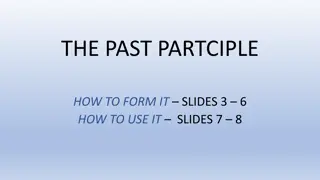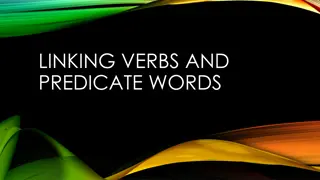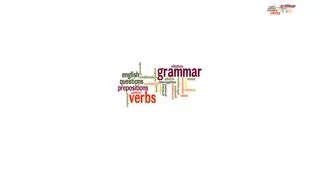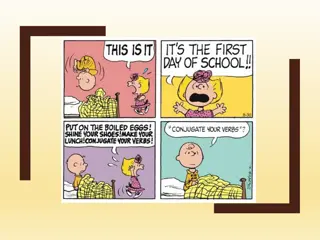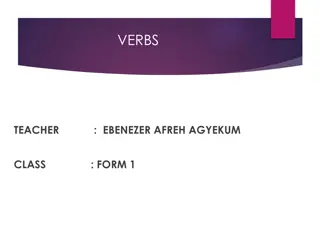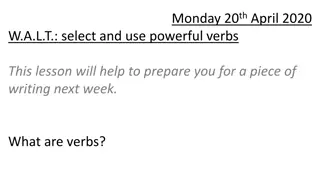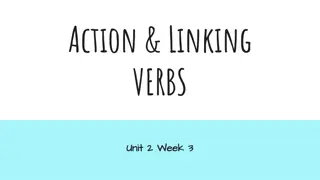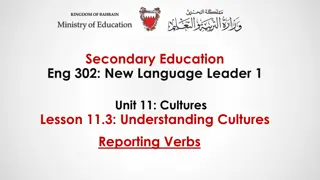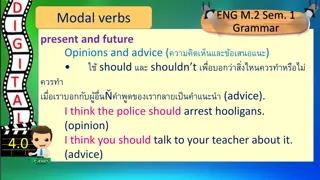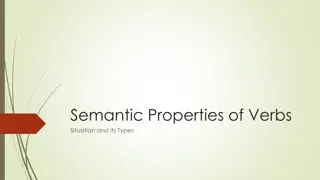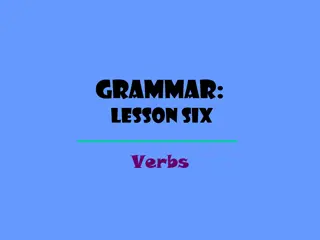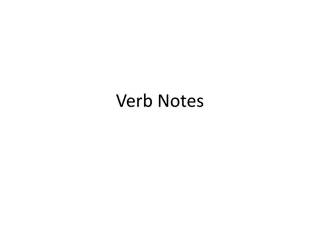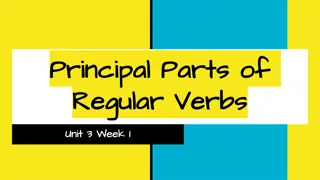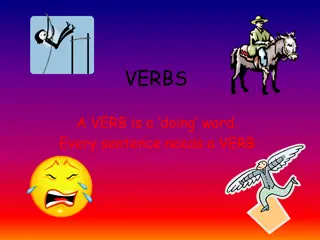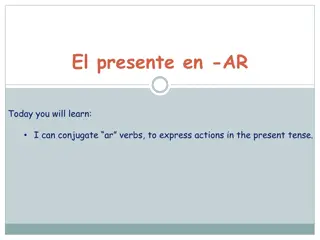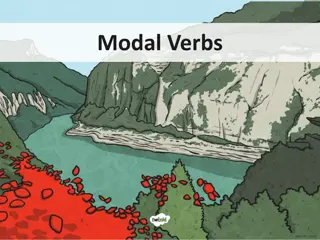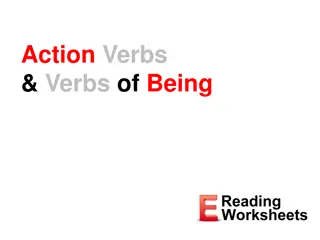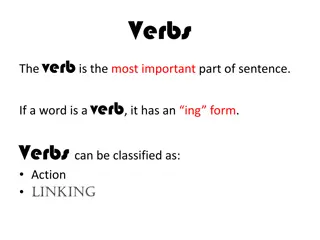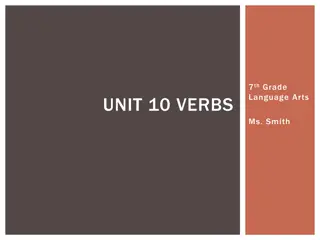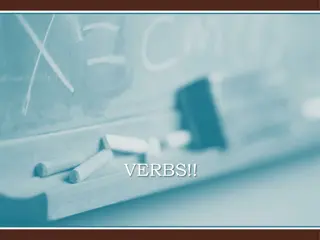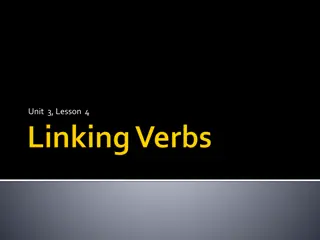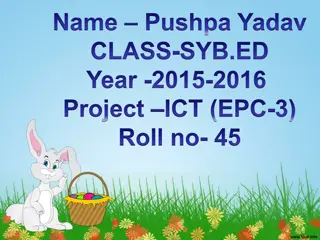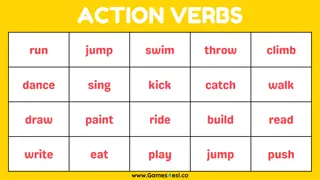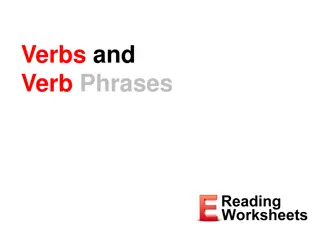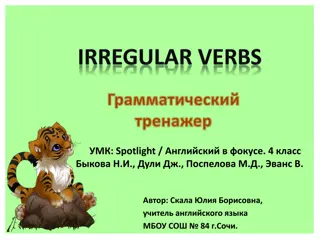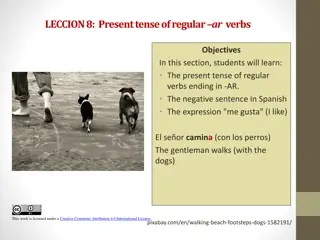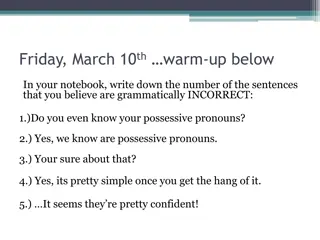Mastering the Past Participle in English Verbs
Understand how to form and use the past participle in English verbs, both regular and irregular. Learn the rules for forming regular past participles, including when to double consonants and when to change 'y' to 'i'. Discover examples of irregular verbs and how their past participles are formed. Ex
0 views • 8 slides
Understanding Linking Verbs and Predicate Words in English Grammar
Linking verbs connect the subject of a sentence with a predicate word, while predicate words follow a linking verb to identify, rename, or describe the subject. Learn about sentence patterns, forms of linking verbs, and how to differentiate between linking and action verbs. Understand the role of pr
1 views • 31 slides
Understanding Verbs: Action vs. State, Dynamic vs. Stative
Verbs are essential in sentences, describing actions or states of subjects. They can convey a sense of action like running or state like being. The distinction between dynamic (action) and stative (non-action) verbs is crucial, with dynamic verbs being used in continuous tenses and stative verbs des
0 views • 31 slides
Understanding Modal Verbs in English
Modal verbs, also known as modals, are auxiliary verbs that express attitudes and levels of certainty in English. They serve various purposes, such as indicating certainty, ability, permission, and making requests. Modal verbs like can, could, may, might, will, would, must, shall, should, and ought
0 views • 19 slides
Understanding Verbs: Introduction and Identification in English
This lesson introduces verbs in English, covering their meaning, identification, and categorization into linking and action verbs. Students will learn to identify verbs in sentences, distinguish linking verbs from action verbs, and understand the importance of verbs in forming meaningful sentences.
0 views • 19 slides
Enhance Your Writing with Powerful Verbs
Explore the importance of powerful verbs in writing through examples and exercises in this lesson. Learn how replacing ordinary verbs with descriptive ones can create vivid imagery and engage readers. Practice selecting powerful verbs to elevate your writing skills and make your narratives come aliv
0 views • 17 slides
Understanding Modal Verbs: Epistemic and Deontic Uses
Modal verbs, such as can, could, may, must, will, and should, play a crucial role in expressing modality in English. This content discusses the epistemic and deontic uses of modal verbs, illustrating how they convey likelihood, ability, permission, suggestions, obligations, and advice. Explore the n
0 views • 34 slides
Understanding Action and Linking Verbs in Sentences
In this unit, you will delve into the essential concepts of action and linking verbs. Action verbs portray activities, while linking verbs connect the subject to its description. Discover tricks to differentiate between the two types of verbs and learn about predicate nominatives in sentence structu
0 views • 7 slides
Mastering Reported Verbs: Understanding and Application
Dive into the intricacies of reported verbs in English language. Explore how to transform direct speech into reported speech using different reporting verbs. Learn about verbs like 'offer', 'promise', 'invite', 'consider', and 'deny' in reported speech structures. Practice reporting the bold parts o
0 views • 9 slides
Understanding Irish Verbs: Grammar Basics and Rules
Learn about Irish verbs, including what verbs are, how to conjugate them, the syntax/order of words in sentences, regular and irregular verbs, as well as broad and slender verbs. Explore examples and images to enhance your understanding of Irish grammar.
1 views • 9 slides
Understanding Modal Verbs in English Grammar
Explore the nuances of modal verbs in English grammar through opinion, advice, and exercises. Learn how to use modal verbs like should, ought to, can, must, and may in present and future contexts. Enhance your language skills with examples and exercises highlighting the correct usage of modal verbs.
0 views • 12 slides
Learning the Future Simple Tense with Regular Verbs in French
Explore how to form, recognize, and use the future simple tense in French for talking about your plans using regular verbs. Understand the differences between le futur proche and le futur simple and learn the endings for conjugating verbs in the future tense.
0 views • 8 slides
Understanding Semantic Properties of Verbs in English Language
Explore the semantic properties of English verbs through various examples and classifications. Discover how verbs like hit, kiss, and touch share common properties, while verbs like make, create, imagine, and build belong to different classes based on their semantic relationships. Delve into the gra
0 views • 17 slides
Understanding Verbs: Types and Usage in Grammar
Learn about verbs in grammar through this detailed lesson, covering action verbs, linking verbs, and helping verbs. Explore examples and practice identifying different types of verbs in sentences. Enhance your understanding of how verbs express action, state of being, and help form complete verb phr
0 views • 15 slides
Understanding Regular and Irregular Verbs in Simple Past Tense
Learn how to form the simple past tense with regular and irregular verbs. Regular verbs end in "-ed," while irregular verbs have unique past tense forms. Examples and images illustrate the differences, helping you master past tense verb usage effortlessly.
0 views • 11 slides
Understanding Regular Polyhedra and Polygons
Regular polygons and polyhedra are fundamental shapes in geometry. A regular polygon has sides and angles that are congruent, such as equilateral triangles and squares. Polygons are simple closed figures made with line segments. Polyhedra are solids bounded by polygons as faces. Regular polyhedra ar
0 views • 18 slides
Understanding Action, Linking, and Helping Verbs
This content provides detailed notes on action, linking (dead verbs), and helping (auxiliary) verbs. It explains how to identify each type of verb and provides examples for practice, along with helpful tips on distinguishing between linking and action verbs. The visuals and explanations make learnin
0 views • 19 slides
Understanding Simple Past Tense in English: Rules and Examples
The simple past tense is a fundamental form in Modern English used to describe past events. It involves regular verbs adding "-ed" and irregular verbs having different forms. The construction of the simple past helps distinguish it from other past tense forms like past perfect and past progressive.
0 views • 33 slides
Understanding Principal Parts of Regular Verbs and Practice Exercises
Explore the principal parts of regular verbs including present, present participle, past, and past participle forms. Understand how regular verbs form their past and past participle, practice exercises to identify verb forms in sentences, and learn about verb conjugation rules.
0 views • 6 slides
Exploring Finite and Non-Finite Verbs in English Grammar
This content introduces the concept of finite and non-finite verbs in English grammar through examples and explanations. It covers the definitions, identification, and usage of finite and non-finite verbs, with practical examples provided for better understanding. The tips mentioned help in distingu
0 views • 20 slides
Explore Verbs: Learning the Action Words
Discover the importance of verbs as action words in sentences through engaging activities. Identify verbs in sentences, select verbs from a list of words, and practice adding verbs to incomplete sentences. Enhance your understanding of verbs and improve your grammar skills in a fun way!
0 views • 6 slides
Mastering Present Tense Conjugation of -AR Verbs in Spanish
Dive into the world of conjugating -AR verbs in Spanish to express actions in the present tense. Learn about the fundamental parts of Spanish verbs, including the infinitive, ending, and stem. Discover how to conjugate regular -AR verbs like hablar (to speak) through detailed explanations and verb c
0 views • 36 slides
Understanding Verb Phrases: Main and Helping Verbs Explained
Learn about verb phrases composed of main and helping verbs, with examples like "might have eaten" and "will read." Discover words that can function as both main and helping verbs, and understand when helping verbs can be separate from main verbs in a sentence. Explore the nuances of verb usage for
0 views • 30 slides
Study on Vitality of Primary Latvian Verbs: A Diachronic Analysis
Primary Latvian verbs are derived from roots preserved in verbs, nouns, or adjectives. Some verbs have disappeared, and factors like semantics and morphology may have influenced their preservation. The study analyzed 461 primary verbs to understand the reasons behind their preservation or disappeara
0 views • 22 slides
Spanish 1 - Learning to Conjugate -ar Verbs
In this lesson, you will learn to conjugate -ar verbs in Spanish. The content covers identifying correct verb conjugations, answering questions using -ar verbs, and recognizing subjects based on verb conjugation. You will also practice with a list of common -ar verbs and learn the conjugation patter
0 views • 17 slides
Khasi Grammar: Verbs and Auxiliary Verbs Explained
Learn about Khasi grammar, including verbs, auxiliary verbs, conjugation rules, and sentence structure. Explore examples and understand how to use verbs in Khasi accurately with practical insights.
0 views • 12 slides
Understanding Modal Verbs: Usage and Examples
Modal verbs are auxiliary verbs that are used in conjunction with main verbs to express various meanings such as possibility, likelihood, necessity, and more. Common modal verbs include may, must, could, should, and will. They play a crucial role in indicating the level of certainty or permission in
0 views • 16 slides
Understanding Action Verbs and Verbs of Being
Explore the differences between action verbs and verbs of being through examples and explanations. Learn how action verbs express actions, while verbs of being indicate a state of being. Delve into forms of "be" and practice with more examples to deepen your understanding of these fundamental gramma
0 views • 10 slides
Understanding Verbs: The Key Elements in Sentence Structure
Verbs are essential components of sentences, with both action and linking verbs. They can form verb phrases with helping verbs and may be interrupted by adverbs. A substitution test involving forms of "to be" can help differentiate linking and action verbs. Explore the nuances of verbs in sentence c
0 views • 4 slides
Understanding Verbs in 7th Grade Language Arts with Ms. Smith
Learn about action verbs, transitive and intransitive verbs, verbs with indirect objects, linking verbs, predicate verbs, and tenses in Unit 10 with Ms. Smith. Explore examples and explanations to enhance your verb knowledge and language skills.
0 views • 8 slides
Understanding Verbs: Types and Usage
Verbs are essential in forming statements and expressing action or states of being. They can show time through different tenses such as past, present, and future. Action verbs depict physical or mental actions, while linking verbs connect the subject with a noun, pronoun, or adjective. Verb phrases
0 views • 8 slides
Understanding Verbs: Types and Forms in English Grammar
Verbs in English grammar play a crucial role in expressing actions and states. They can be classified into various types such as action verbs, linking verbs, main verbs, auxiliary verbs, transitive verbs, intransitive verbs, and phrasal verbs. Verbs have six forms including base form, infinitive, pa
0 views • 13 slides
Understanding Phrasal Verbs in English Language Courses
The content discusses the concept of phrasal verbs in English language, particularly focusing on the differences between verbs and phrasal verbs. It explains that phrasal verbs are combinations of verbs and adverbs or prepositions that convey specific meanings. Examples and explanations of various p
0 views • 9 slides
Understanding Linking Verbs in English Grammar
Learn about linking verbs in English grammar. Discover how linking verbs connect the subject of a sentence with a word in the predicate. Differentiate between action verbs and linking verbs with examples. Explore common linking verbs and their role in sentence structure. Enhance your understanding o
0 views • 14 slides
Common Regular Verbs and Their Past Tenses
Common regular verbs and their past tenses are essential aspects of grammar learning. Past tense forms of verbs are used to indicate actions or states that have already occurred. Examples of regular verbs and their corresponding past tenses are provided in this content, along with spelling rules for
0 views • 17 slides
Explore a Variety of Verb Activities with Games4esl.co
Dive into the world of verbs with a collection of images showcasing action verbs, daily routine verbs, school verbs, housework verbs, travel verbs, body movement verbs, cooking verbs, sports and exercise verbs, emotion verbs, and social verbs. Enhance your vocabulary and language skills through enga
0 views • 10 slides
Understanding Verbs and Verb Phrases
Verbs express actions or states of being, while helping verbs indicate time. By combining with helping verbs, verb phrases are formed. Examples and explanations are provided to make learning about verbs and verb phrases easier.
0 views • 9 slides
Irregular Verbs: A Handy Guide to Commonly Used English Verbs
An overview of irregular verbs in English, including common examples of irregular verbs and their past participle forms. The content also includes images illustrating the verbs in different forms, making it easier to understand and remember irregular verb patterns. Helpful for English learners and a
0 views • 6 slides
Learning Regular -AR Verbs in Spanish Present Tense
Introduction to regular -AR verbs in Spanish, focusing on conjugation in the present tense, negative sentences, and the expression "me gusta" (I like). Learn about verb infinitives, conjugation patterns, and using definite articles with likes and dislikes. Practice recognizing common -AR verbs and f
0 views • 6 slides
Understanding Verbs: Types and Examples
Explore the world of verbs by understanding the different types - action, state of being, linking, and helping verbs. Learn how verbs express action, existence, or connection in sentences through clear examples and definitions. Dive into recognizing and identifying verbs in various contexts to enhan
0 views • 18 slides
